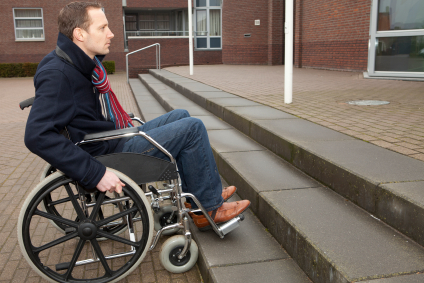St. Louis & Jefferson City ADA Attorneys
The public accommodation discrimination lawyers at Dashtaki Law Firm exclusively represent individuals who have been denied access or refused services on the basis of their disability in a place of public accommodation. Located in St. Louis and Jefferson City, Missouri, the ADA attorneys at Dashtaki Law Firm have extensive experience fighting for equal access and improving accessibility for people with disabilities in places of public accommodation. If you need a public accommodation discrimination lawyer to fight for you, the ADA attorneys at Dashtaki Law Firm stand ready to protect your rights and will assist you with any discrimination issues in a place of public accommodation.

Please click on the question below to browse our ADA/public accommodation FAQs.
Public Accommodation
A place of public accommodation means any place or service offering to the public accommodations, advantages, facilities or privileges whether in the nature of goods, services, lodgings, amusements or otherwise. Places of public accommodation include a wide range of entities including, but not limited to: restaurants; public transportation; taxicabs; hotels/motels; theaters; doctors’ offices; websites; gas stations; pharmacies; retail stores; museums; libraries; schools; day care centers; parks; arenas; any public facility owned, operated, or managed by or on behalf of state or local governments; or any agency or municipality supported in whole or part by public funds. Private clubs and religious organizations are exempt from the requirements for public accommodations.
The ADA does not cover strictly residential private apartments and homes. If, however, a place of public accommodation, such as a doctor’s office or day care center, is located in a private residence, those portions of the residence used for that purpose are subject to the ADA’s requirements. Similarly, the leasing office of an apartment building or apartment complex, as well as a model apartment or home used for sales purposes, is a place of public accommodation subject to the ADA’s requirements.
Barrier removal must be effected when it is “readily achievable” to do so. “Readily achievable” means “easily accomplishable and able to be carried out without much difficulty or expense.” The decision of what is readily achievable is made considering the size, type, and overall finances of the public accommodation and the nature and cost of the access improvements needed. Barrier removal that is difficult now may be readily achievable in the future as finances change. Although not mandatory, the ADA recommends four priorities for barrier removal: (1) accessible approach and entrance; (2) access to goods and services; (3) access to public toilet rooms; and (4) access to other items such as water fountains and public telephones.
The ADA requires that all new construction of places of public accommodation, as well as of “commercial facilities” such as office buildings, be accessible to all persons.
The cost of incorporating accessibility features in new construction is less than 1% of overall construction costs. This is a small price in relation to the economic benefits to be derived from full accessibility in the future, such as increased employment and consumer spending. Conversely, retrofitting a place of public accommodation to remove barriers can be very expensive. Remediation can cost between 25% to 40% of the original overall construction costs.
All alterations that could affect the usability of a facility must be made in an accessible manner to the maximum extent feasible. For example, if during renovations a doorway is being relocated, the new doorway must be wide enough to meet the new construction standard for accessibility. If a new sidewalk is installed, the new sidewalk must be accessible. When alterations are made to a primary function area, such as the lobby of a bank or the dining area of a cafeteria, an accessible path of travel to the altered area must also be provided. The bathrooms, telephones, and drinking fountains serving that area must also be made accessible. These additional accessibility alterations are only required to the extent that the added accessibility costs do not exceed 20% of the cost of the original alteration.
Examples include the ramping of a few steps, installing curb cuts, the installation of grab bars where only routine reinforcement of the wall is required, designating accessible parking spaces, the lowering of telephones and other similar modest adjustments.
With respect to websites, readily achievable modifications would be correctly designing, developing, and editing website information and functionality.
Yes. A service animal is not a “pet.” The ADA requires all places of public accommodation to modify their “no pets” policy to allow the use of a service animal by a person with a disability. Additionally, restaurants must allow service animals in public areas even where state or local health codes prohibit animals on the premises. The ADA provides greater protection for individuals with disabilities and so it takes priority over the local or state laws or regulations.
The ADA places the legal obligation to remove barriers or provide auxiliary aids and services on both the landlord and the tenant. The landlord and the tenant may decide by lease who will actually make the changes and provide the aids and services, but both remain responsible legally.
Contact an experienced ADA discrimination lawyer today
Public accommodation discrimination cases can be highly complex, so it is essential to speak with an experienced Missouri public accommodation lawyer immediately. If you have been discriminated against, we can help. The ADA attorneys at Dashtaki Law Firm will support you through the process and offer choices to protect your rights. If you have been the victim of discrimination in a place of public accommodation based on your disability, contact an experienced Missouri public accommodation discrimination lawyer immediately to understand your legal rights because you have a very limited time to take action, as any delay may cause you to lose your rights.
The Dashtaki Law Firm offers a free and confidential initial consultation to review your case. Contact the lawyers at Dashtaki Law Firm today so that we can begin our investigation.
The ADA / public accommodation discrimination attorneys at Dashtaki Law Firm, LLC, serve clients throughout Missouri, including St. Louis City, St. Louis County, Jefferson County, St. Charles County, Franklin County, Cole County, Boone County, Camden County, Callaway County, Osage County, Moniteau County, Miller County, Morgan County, Warren County, Jefferson City, Columbia, Lake of the Ozarks, Osage Beach, Camdenton, Fulton, Linn, Tipton and California, MO.
Sources:
2010 ADA Standards for Accessible Design
§ 209.150, RSMo
§ 213.065, RSMo
Office of the Missouri Attorney General
St. Louis Public Accommodation Discrimination Lawyer Cyrus Dashtaki Home
Contact Jefferson City, Missouri ADA Public Accommodation Attorney Cyrus Dashtaki

